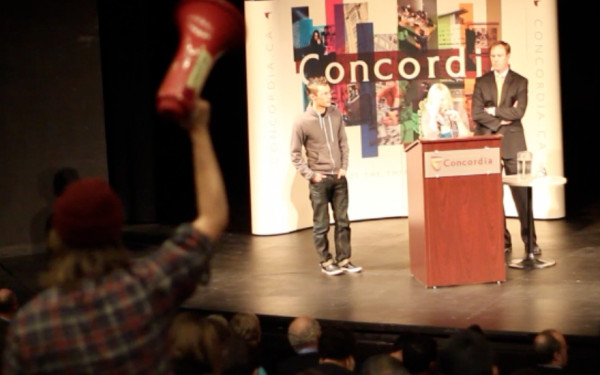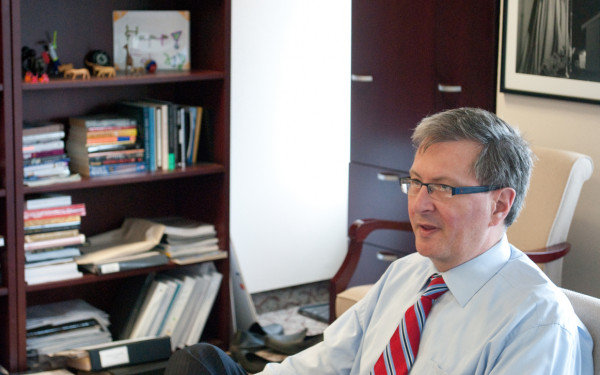Alan Shepard Gives Hope to Concordia
One Year Later, Though, Many Problems Remain
It’s been a transformative year for Concordia.
When Alan Shepard was hired to be the university’s next president, things were a little rocky.
Several dismissed administrators and years of infighting at the Board of Governors had trickled down to a school torn apart by the student strike. Shepard wasn’t even able to give a proper public presentation, as a handful of students cut him off with bullhorns and chanting.
Only a year later, it’s hard to believe that was this same school.
Things at Concordia are by no means perfect, but they’re certainly looking up.
The Board, now chaired by Norman Hébert, Jr., bears virtually no resemblance to that led by former Chair Peter Kruyt. That BoG rarely made it through an agenda, shouting was not uncommon and an external report accused the group of exhibiting a “culture of contempt.”
This year, BoG meetings moved along quickly without agitating governors. When history department Chair Norman Ingram raised concerns about administrative salary increases, student representative Lex Gill noted aptly that it was amazing the BoG was finally a respectful enough place to handle such critical questions.
Senate meetings, which used to last excessively long, now usually end expediently. And while some senators have complained this cuts down on important pedagogical debate (it does), the general consensus seems to be relief. After all, no one loved spending five straight hours on a Friday afternoon in a Senate meeting.
Of course, things haven’t gotten better for everyone.
Last year, several unions were in negotiations and all said they were reaching their last straw.
Since then, things have only gotten worse. Both faculty unions voted in favour of strike mandates this year (the full-time professors did, however, reach a tentative deal).
The teaching and research assistants have begun discussing striking as well. And the Sir George Williams campus United Steel Workers are nowhere closer to solving their contract woes than they were in 2011, when they passed a strike mandate. Their counterparts at the Loyola campus passed a similar mandate last November.
So it’s no surprise that Shepard’s commitment to keeping negotiating out of the public eye is starting to irk some members of the community.
One professor and senator said that in this time of labour crises, Shepard was avoiding being the leader Concordia needed.
No one expects or needs Shepard to speak to the details of a contract, but it would have been nice to hear him give an official timeline or commit definitely to solving the issues before a certain date.
Still, there is plenty of warranted excitement when it comes to Shepard and what he might bring to Concordia.
When he was provost and VP Academic of Ryerson University, Shepard revitalized university space. He let the student body submit proposals to improve student space and vote on things as specific as the furniture.
He also imagined and created the Digital Media Zone. It’s meant to help mimic a start-up culture in the university context by bringing entrepreneurs, businesses and students together.
Needless to say, he’s got the Concordia community itching to see what he’ll do with space here.
A handful of department chairs all noted in early November that projects like the DMZ were what gave them so much faith in Alan Shepard.
Concordia probably won’t be seeing a DMZ any time soon, but Shepard has been in discussion with Montreal’s Notman House, a start-up incubator just west of St. Laurent Blvd. He hopes that working with them can bring start-up culture into Concordia’s walls.
That doesn’t mean he’s not planning big things for the university’s current space. But Shepard admits he took most of his first year getting to know the place.
He says the first step is to focus on what we already have. Shepard was blown away by the quality of Concordia research facilities, a part of the school he wants to ensure only gets better.
We will likely see work done in the library soon, and thanks partially to government grants, Concordia now owns two floors of the Faubourg Building.
Shepard’s real test will be the sexual assault centre. While it’s a relatively small project, it’s representative of Concordia falling behind schools like McGill. This year saw little progress, although Shepard did meet with Concordia’s 2110 Centre for Gender Advocacy to discuss needs, so hopefully it’s on his radar.
Of course, it’s not only physical space at Concordia that Shepard is worried about.
These days, it’s difficult to talk to the man without discussing online learning. He has repeatedly said that Concordia “needs to be a leader” in something he feels we’ve fallen behind on.
That mentality is what worries student senator and incoming VP Academic and Advocacy Gene Morrow, however, who said that it’s hard to be a leader in a field others have been pioneering for years.
And it’s still pretty unclear what, exactly, Shepard hopes to do. The recent presentation at Senate by associate professor Saul Carliner felt more like a car salesman’s pitch for online learning than a discussion on its merit.
There was talk of more online classes and “blended” approaches of both online and physical, but it’s clear Concordia is still in the early stages.
And while there are major pitfalls to rushing into online learning, Shepard tends to have the right approach. It’s stellar that the university hosted a conference on online learning, and it seems that the president is trying to get as much community input before continuing.
Of course, Shepard’s biggest concern is boosting the school’s reputation.
It’s probably why he’s almost always wearing a maroon tie, and why he ends most Senate meetings with a plea for those in the room to brag about the university.
Even when speaking with the press, Shepard usually attempts to manoeuvre the conversation from an interview to a discussion about how to boost our image.
While Concordia’s need for an image bump is debated by no one, that appeal is starting to wear thin.
He has a habit of focusing on making things seem fixed before they actually are. Several professors have expressed exasperation that he asks for this sort of bragging without addressing their concerns about working conditions.
Even with online learning, he’s imploring senators and governors to look past problems with the for-profit company running our online classes before fixing the problems at hand.
Since Shepard took office, I’ve made a point of ending most of my interviews the same way. I asked professors, student leaders, union representatives and administrators what they think of our new president. And while there are areas of concern, the resounding response was positive.
After a decade-long governance crisis, it finally feels like Concordia has a face it can stand behind. In just under a year, Shepard has managed to gain not only the respect, but the goodwill of a university so recently in chaos.
And that—more than getting senators to brag, or carving out an impressive space in the e-learning market—is what might truly change our brand.

_1_900_600_90.jpg)



_1_600_375_90_s_c1.jpg)
_600_375_90_s_c1.jpg)